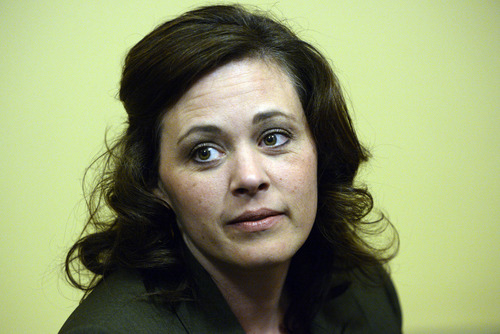This is an archived article that was published on sltrib.com in 2014, and information in the article may be outdated. It is provided only for personal research purposes and may not be reprinted.
A decision on whether to expand health coverage to the poorest Utahns may be put off for months, as House Republicans said Friday they want to take more time to study the issue.
That puts them at odds with Gov. Gary Herbert, who has staked out his support for using $258 million in federal money to cover 111,000 Utahns who make less than $15,500, and Sen. Brian Shiozawa, who plans to try to push Herbert's plan through the Senate before the session ends Thursday.
Herbert said that regardless what the Legislature does, he expects to go ahead with pushing the Obama administration to grant Utah flexibility in how it uses federal funds to cover Utah's needy.
"What I've said to both [legislative] bodies is, whatever you decide to do … don't tie my hands. Let me go back and try to negotiate the best deal I can for Utah," Herbert said. "Whatever the House and Senate do I'm going to move ahead with that kind of attitude."
The jockeying over expanding Medicaid as allowed under the Affordable Care Act has been playing out for weeks, with the House staking out a position early in the session to use $35 million of state money and $80 million of federal funds to provide some level of health care to an unknown number of Utahns.
Shiozawa, adopting a plan from the Health Reform Task Force which spent months studying the issue, proposed using federal money to help subsidize insurance for a larger number — an estimated 54,000 in all. Herbert's Healthy Utah plan, released last week, would go even further, helping to buy insurance for more than twice that many residents.
Sen. Gene Davis, D-Salt Lake City, was proposing a full Medicaid expansion envisioned by the Affordable Care Act, but his bill was voted down by a Senate committee Friday evening.
Davis argued that Utah has lost nearly $8.8 million in money Utahns have paid to the federal government by not expanding Medicaid and it will continue to lose $4 million a month until it acts.
"On a second-by-second basis we continue to lose dollars," Davis said. "All [Medicaid expansion] does is bring these dollars back to Utah. … They're the citizens' dollars coming back the way it's intended."
With time running out in the session, Senate leaders indicated early this week that they might well not do anything on health-care coverage and instead let the governor work with the U.S. Department of Health to see what kind of deal he could negotiate. House Republicans decided this week to likewise take a wait-and-see approach and spend more time studying the issue.
House Majority Whip Greg Hughes, R-Draper, said the Republican caucus felt like the health-care decision it was making "changes permanently the way you fund health care.
"Irreversible decisions ought to be made with as much deliberation and as much information as you possibly can," Hughes said.
To that end, Rep. Jim Dunnigan, R-Taylorsville, amended his health-reform bill before the House Friday, to give the state "a path forward" and allow the Health Reform Task Force to find a solution for how to cover low-income uninsured residents if a compromise plan can't be reached.
"Currently we don't have an agreement between the House and Senate and governor, but it is something that continues to need to have a solution," Dunnigan said. "So we're proposing as a mechanism to facilitate that additional discussion, should something not be resolved by the end of the session, we'll give that assignment to the Health Reform Task Force."
House Speaker Becky Lockhart, R-Provo, said the decision by the House not to embrace any policy doesn't tie the governor's hands.
"The executive branch doesn't need permission from the legislative branch to negotiate deals with the Obama administration," she said. "[The governor has] been doing that already, apparently, on his trips to D.C."
If the Legislature doesn't act, it could mean further delays before Utah makes any decision on whether to expand Medicaid. It already is one of the last states in the country to decide on Medicaid policy. The governor's Medicaid director said this week that, even after the state settles on a plan, it could take three to six months before the Obama administration approves Utah's plan. The governor would also have to call the Legislature back into special session to approve funding for any coverage proposal.
Shiozawa, R-Cottonwood Heights, plans to bring a bill before the Senate next week that would express support for the governor's health-care plan, which he said would give the governor the support of the Legislature as he tries to strike a deal. He said the Legislature has had task forces, consultant studies, summits and shouldn't put off making a decision.
"We have to make a choice and either do nothing and kind of go with the House plan, which costs a bunch of money and gets us" the state's Primary Care Network, stripped-down coverage that Shiowzawa says is inadequate. "Or we can go for partial [expansion] or a block grant like the governor is trying to do and then we get a bunch of money from the feds and we can get the coverage gap and go forward."
Twitter: @RobertGehrke



